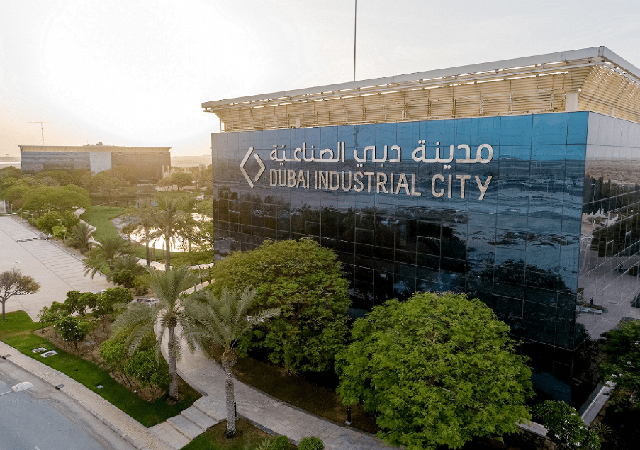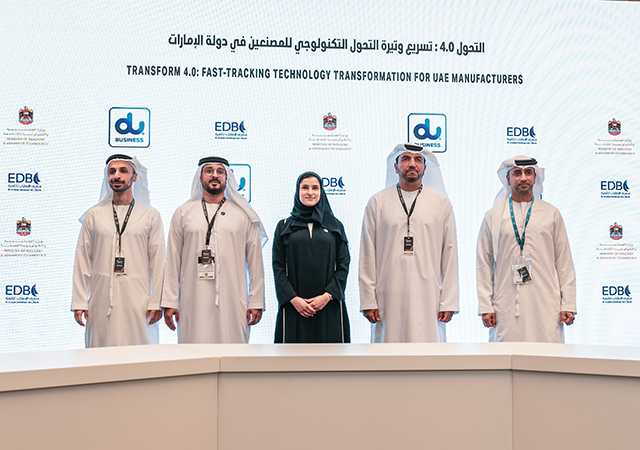
 Dubai Industrial City emerges as thriving hub for manufacturing and logistics
Dubai Industrial City emerges as thriving hub for manufacturing and logistics
Dubai Industrial City, a leading industrial and logistics destination within the TECOM Group, has continued to cement its position as a global manufacturing and investment destination. In recent months, the business district has signed a series of high-profile agreements and expansions, reflecting its growing appeal to international investors and manufacturers.
NEW PHARMA AND INNOVATIVE MEDICINE FACTORY
Dubai Industrial City has signed a landmark AED130 million ($35 million) agreement with MD Pharma Factory during the recent Make it in the Emirates Forum. This deal aligns with national initiatives such as Operation 300bn, Make it in the Emirates, and the Dubai Economic Agenda 'D33', further solidifying the district's role in diversifying the regional economy and boosting the competitiveness of the industrial sector.
Under the agreement, MD Pharma Factory will develop the first Egyptian medicine manufacturing facility in the UAE, spanning a 223,000 sq ft land plot. The factory, slated to launch in 2025, will produce a range of intravenous solution products for markets in the GCC and Africa, showcasing Dubai Industrial City's ability to attract and support international manufacturers in establishing their operations in the region.
“There is no substitute for lasting value that is created by fostering a robust homegrown manufacturing sector,” said Saud Abu Alshawareb, Executive Vice President – Industrial at TECOM Group, on behalf of Dubai Industrial City.
EXPANDING LAND CAPACITY TO BOLSTER LOCAL SUPPLY CHAINS
In a strategic move, Dubai Industrial City has unveiled the launch of an additional 13.9 million sq ft of land capacity within its ecosystem, acquired through AED410 million ($ 111 million) transaction. This expansion is in direct response to the performance witnessed by the district over the past 18 months, driven by pro-growth initiatives.
The additional land capacity aims to bolster local supply chains and promote homegrown manufacturing in the UAE and Dubai. The strategically located and well-connected land plots are poised to attract more international and regional investors, further strengthening Dubai Industrial City's position as a leading manufacturing and logistics hub in the region.
Dubai Industrial City's success is further reflected in its growing customer base, with a 12 per cent year-on-year increase in land occupancy, reaching 97 per cent in the first quarter of 2024. The district has welcomed a diverse array of international customers, including Indian pharmaceuticals giant Himalaya Wellness and vertical farming specialist Sokovo.
“The manufacturing sector is essential to accelerate the development of smart solutions that can pre-emptively solve tomorrow’s challenges, and nurturing its growth is essential to safeguard socioeconomic growth that endures for generations,” said Abu Alshawareb.
NEELKANTH CABLES TARGETS GLOBAL EXPANSION
Neelkanth Cables has recently inaugurated its state-of-the-art manufacturing facility at Dubai Industrial City, representing an investment of AED 130 million. The 503,000 square footage factory will produce low- and medium-voltage conductors and instrumentation cables, with a throughput of 20,000 metric tonnes per annum, serving customers across the UAE, GCC, South Asia, and Africa.
Sanjeev Dubey, Chief Operating Officer at Neelkanth Cables Manufacturing, said: “We are committed to supporting the local community and the economic ecosystem of the UAE, intending to proudly contribute to Dubai’s growth and development for years to come. Dubai Industrial City was our first choice for the new facility due to its strategic location close to major transportation hubs facilitating efficient logistics and distribution, its modern infrastructure providing a conducive environment for various industrial activities, and excellent support services including business set-up assistance, licensing, and approvals.
UAE'S FIRST INTEGRATED BATTERY RECYCLING PLANT BY DUBATT
In a step towards sustainability, Dubatt Battery Recycling has inaugurated its fully integrated battery recycling plant at Dubai Industrial City. The facility is the first of its kind in the UAE and is strategically aligned with several key UAE sustainability initiatives, including the Industrial Decarbonisation Roadmap, the Circular Economy Policy 2031, and the Dubai Integrated Waste Management Strategy 2041.
The plant, with a built-up area of 65,000 square footage and advanced recycling technologies, can safely extract hazardous waste from used lead acid batteries and recycle up to 80 per cent of battery waste produced in the UAE.
Dubatt has also signed a musataha agreement to expand the plant, increasing its total investment at Dubai Industrial City to AED 216 million. The planned 50,000 square footage expansion, valued at AED 96 million, will raise the factory's lead acid battery recycling capacity to 75,000 metric tonnes per year. It will also introduce dedicated lines for lead billets, wires, and shots, as well as facilities for battery plastics, lithium batteries, and e-waste.
The improper disposal of battery scrap can have significant environmental and health consequences, as it can contaminate soil and groundwater. According to Dubatt’s estimates, around 90 per cent of the UAE's battery scrap is exported for recycling.
Dr Amna bint Abdullah Al Dahak, Minister of Climate Change and Environment, said: "Dubatt Battery Recycling’s unveiling of a new integrated battery recycling plant is an example of the decisive action being taken in the UAE to protect its communities from the impact of climate change. UAE Circular Economy Policy 2031, launched in 2021, commits to diverting 75 per cent of waste from landfill, and pledges to act on controlling movement of hazardous waste."
FUELING GROWTH IN THE F&B SECTOR
Dubai Industrial City's success extends beyond the manufacturing and logistics sectors, with the district witnessing robust growth in the Food and Beverage (F&B) industry. In 2023, the district welcomed 12 new F&B customers, representing cumulative investments worth AED 800 million, further cementing its role as a proponent of advanced manufacturing and the regional circular economy.
The new F&B customers reflect the appeal of Dubai Industrial City to food manufacturers and innovators from around the world. Overall customer growth reached 17 per cent during 2023, with more than 1,000 local, regional, and global manufacturing leaders, including F&B industry innovators and heavyweights, now based at the district.
Dubai Industrial City's sector-specific infrastructure, including industrial lands, storage and logistics spaces, and cold-storage facilities, enables national socioeconomic and environmental mandates by supporting advanced agricultural practices and sustainable production. The district's connectivity to critical local and national road networks, Al Maktoum International Airport, Jebel Ali Port, and an Etihad Rail terminal further strengthens the supply chain of its F&B customers, such as A.P. Moller – Maersk, which opened its first cold store in the UAE at Dubai Industrial City last year.
“Advanced manufacturing is the cornerstone of global food security, and it must be relentlessly promoted to ensure a sustainable food system for generations to come,” said Abu Alshawareb. “A resilient circular economy can accelerate nutrition security by conserving resources and creating new economic opportunities, and we are proud to catalyse such win-win solutions for businesses, the environment, and future generations through the holistic ecosystem that is Dubai Industrial City’s F&B zone.”
Through its strategic partnerships, targeted investments, and sector-specific infrastructure, Dubai Industrial City is poised to play a pivotal role in the UAE's industrial and economic transformation. By aligning with national initiatives, supporting local and international manufacturers, and prioritizing sustainability, the district is firmly establishing itself as a leading destination for advanced manufacturing and logistics, contributing to the country's vision for a diversified, knowledge-based economy.

